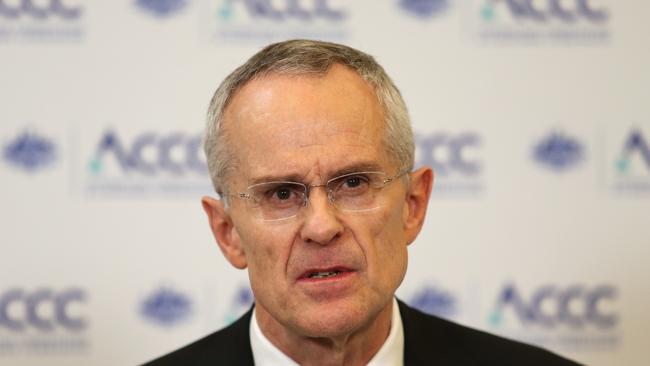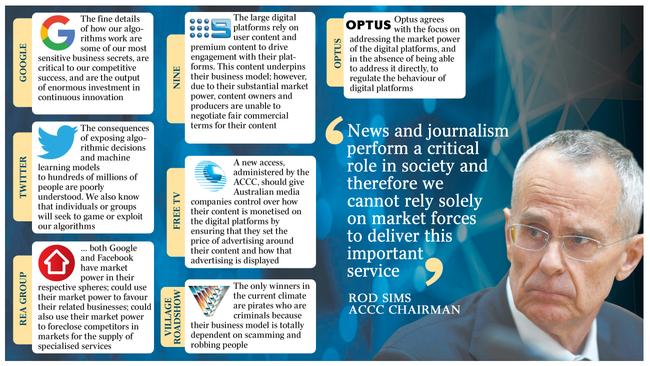Media hard line on tech titans
Nine Entertainment and other media players have backed calls for the ACCC to police digital giants Google and Facebook.

Nine Entertainment has backed calls for the ACCC to patrol digital giants Google and Facebook, as well as new rules for Australian media businesses to retain control of their own content.
The company, which now owns all of the media properties formerly owned by Fairfax including The Sydney Morning Herald and The Age, said the market dominance of Google and Facebook meant regulatory intervention was required to ensure publications and their journalists are adequately paid for content.
“Content commercialisation is at the core of our concerns with the digital platforms,” Nine said in its submission to the ACCC obtained by The Australian. “On conservative estimates Google’s YouTube and Facebook attract a CPM [cost per thousand impressions] that is 50 per cent to 80 per cent lower than what can be achieved on our owned and operated platform of 9Now.
“Google and Facebook are significant advertisers and distributors of Australian news and entertainment content, and given their substantial market power, Nine submits that new regulatory rules are required to address these market imbalances and protect the public good of news media and Australian content.”
The submission puts the company at odds with Google, with which it has a number of commercial partnerships and has dismissed the need for a regulator.
Google said in its submission that it does not support additional regulatory oversight of news ranking, while fellow tech giant Twitter said it also could be trusted to self-regulate.
“While Google is a valued partner for our Metro publishing business, it remains a major competitor for audiences and advertising spend in other areas of the business, including through YouTube,” Nine said.
The company meanwhile did not hold back on Facebook, saying that many millennial users were missing out on quality journalism due to Facebook and its subsidiary Instagram’s algorithms.
“The business model of Facebook as a closed ecosystem should be a concern to policy
makers,” Nine said. “Due to its commercial model, which heavily restricts the media’s ability to monetise their content, no incentive currently exists for Nine to distribute our news content widely.
“While we have conducted trials to explore the viability of engaging with Facebook’s commercial models, these are not currently viable commercial models for Nine based on Facebook’s existing products and services and approach to the market.”
In a preliminary report probing the tech giants’ impact on news and society, released in December, the ACCC proposed a regulator that would force the tech giants to lift the lid on their mysterious algorithms and provide transparency around how news stories are ranked and served to users.
Nine today also called for a tax offset for news and a personal tax deduction for subscriptions, and said those initiatives would help boost local journalism.
Public broadcaster SBS meanwhile described the current regulatory system as challenging, and said there were “opportunities for modernisation and streamlining.”
“SBS supports the ACCC’s finding that the current regulatory framework for the Australian media indstury requires significant updates to accommodate technological changes,” SBS said in their submission in response to the ACCC’s preliminary report.
Even though Google and Facebook don’t produce content, SBS said they are “responsible for who, and how may people, see the journalistic content that is posted on their platforms, with parameters continuing to change for content creators.”
In is submission, SBS reiterated that it remains concerned about the transparency of Google and Facebook’s algorithms.
The Australian Press Council said greater regulatory power is needed, but suggested they could be assigned to an existing regulatory.
Rather than create a new entity, the council suggested the extra policing be carried out by the ACCC, which has “deep experience in analysing and responding to issues of market power and through this inquiry has built expertise in the operations and impact of the digital platforms.”
Industry body Country Press Australia and a number of regional news outlets welcomed the ACCC’s calls for regulation on advertising spend and content distribution.
The CPA argued legislation would ensure a fair percentage of advertising could be allocated to regional publishers, and welcomed legislation to stop, or make the platforms pay for, content created by regional publishers.
Businesses, including Star News Group, Provincial Press Group and local Narrabri title, the Courier, also pushed the need for more specific details around the government’s innovation fund.
“The traditional sources of revenues which sustain our business have been and continue to be reduced significantly due largely to revenues being taken by Google and Facebook,” the Courier’s owners, Ian and Wanda Dunnet, said.
“Specific funding of journalists, guaranteed Government spend to communicate and inform the community and extending the current innovation fund beyond three years would be more practical and useful for publishers to ensure longevity and continue their ability to service their local communities with quality journalism that serves the public interest.”
Meanwhile the broader telecommunications sector is concerned about the scope of the regulatory reform proposed by the ACCC.
Industry body Communications Alliance said in its submission that any regulatory measure must focus squarely on the likes of Facebook and Google and not exceed their scope.
“Any recommendations that go beyond specifically addressing the identified policy question (digital platforms and their societal impact) are premature and would require significantly more evidence-based investigation and consultation,” it said.
The industry is particularly worried about the proposed amendments to the Privacy Act 1988 as the ACCC looks to regulate the use and collection of personal information.
“It’s not clear that far-reaching measures such as facilitating the erasure of personal information where consent has been withdrawn are appropriate, useful and/or economically and technically feasible.”
“It may also stand in conflict with existing and proposed data retention obligations in the Telecommunications (Interception and Access) Act 1979 as well as the Consumer Data Right (CDR) regime that is currently under development by the Federal Government and the Telecommunications Consumer Protection Code,” it added.
Optus, which has put in a submission of its own, has also highlighted the risk of scope creep.
According to the telco, several of the recommendations proposed to curb the power of Facebook and Google could end up hurting other players.
“While application to digital platforms may be warranted, the changes should not be applied to businesses and organisations more broadly without appropriate review of the existing frameworks that govern those industries.”
“Any changes arising as a result of this inquiry be limited to the digital platforms that have been identified as having significant market power (SMP) and have abused their dominant position,” the telco said.
“Optus is concerned that the discussion on the impact of digital platforms on consumers extends into broad regulatory reforms impacting the whole economy.”
“The preliminary report recommends reforms to regulations impacting all Australian firms on the basis of the behaviour of two firms with market power, Optus does not support such an approach.”

However, the Australian Communications and Media Authority (ACMA) is backing the competition regulator’s recommendations to the hilt, saying that there was a clear case for bringing digital platforms under a regulatory framework.
“Digital platforms emerged as innovative ‘start-ups’ but have become global behemoths,” ACMA said in its submission.
“These platforms now have significant market power in Australia as a consequence of their dominance in digital advertising and media content, including news.”
According to ACMA, the case for regulatory intervention is particularly strong in relation to news and journalistic content.
“Digital platforms have significant influence due to their roles as aggregators, curators and distributors of content, in particular news and journalistic content, yet are not considered within established influence measures.”
“Any new regulatory framework will need to consider whether the ways in which ‘influence’ and ‘control’ are monitored, measured and responded to can be adapted to the new media environment,” it said.
ACMA added that it can provide the regulatory oversight to monitor, investigate and report on the ranking of news and journalistic content by digital platforms and the provision of referral services to news media businesses.
Additional reporting: Supratim Adhikari




To join the conversation, please log in. Don't have an account? Register
Join the conversation, you are commenting as Logout